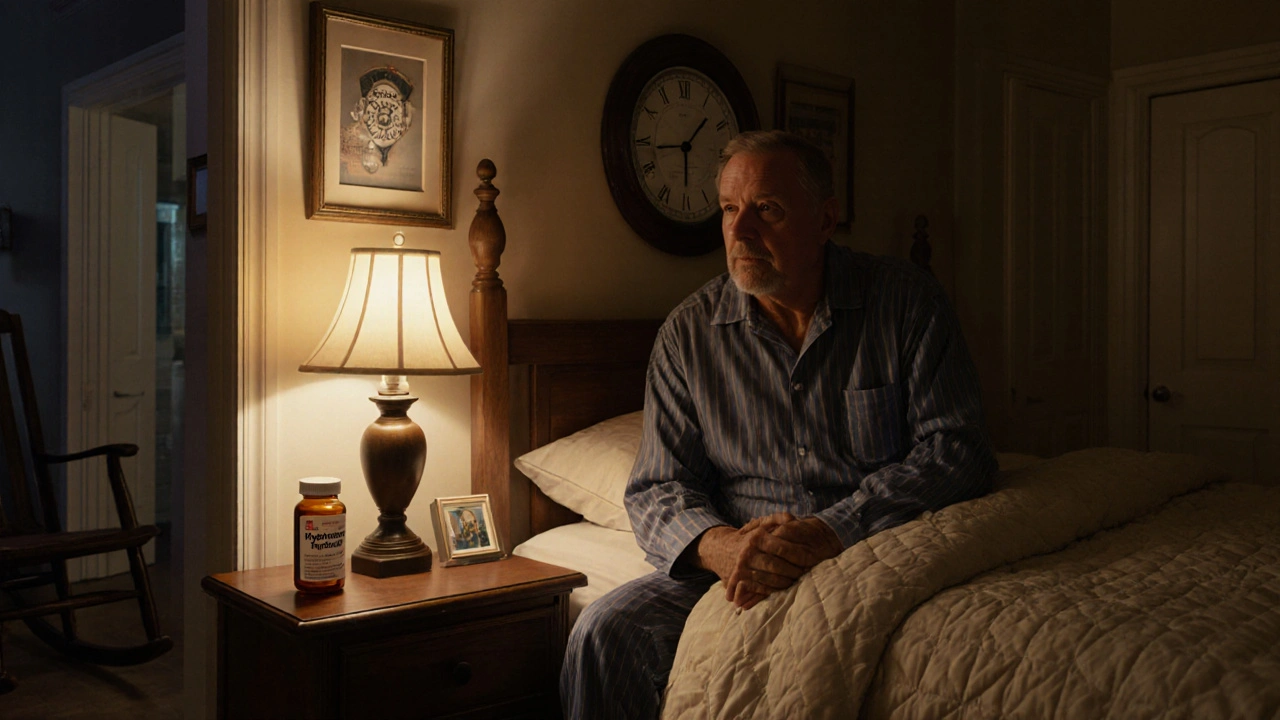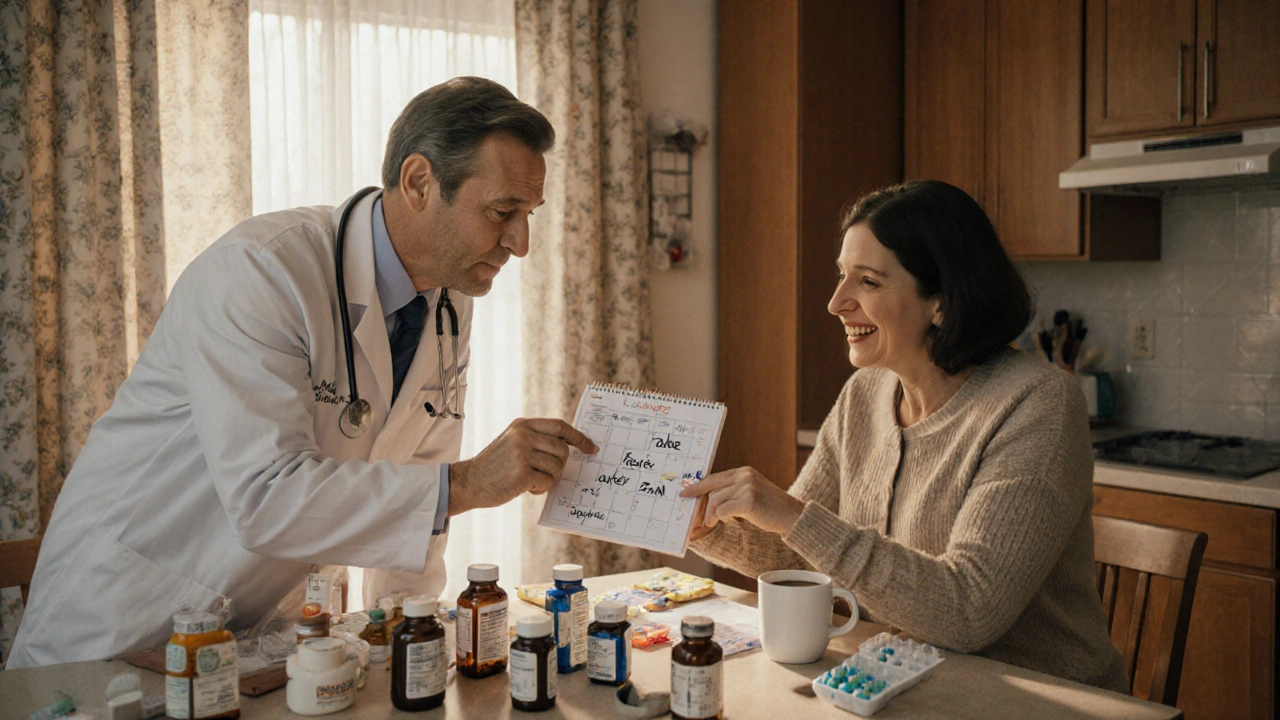Frequent Urination and Urgency from Medications: Bladder Side Effects

Medication-Induced Urinary Symptoms Calculator
Is Your Medication Causing Urinary Issues?
Answer these questions to determine if your symptoms match common medication side effects. Based on clinical studies from the article.
Recommended Actions
Why You Might Be Peeing Too Often - And It’s Not What You Think
If you’ve started going to the bathroom more than usual - especially at night - and you’re not drinking more water, there’s a good chance your meds are to blame. It’s not just aging. It’s not just a weak bladder. It’s often a side effect of something you’re taking every day. Millions of people deal with this quietly, thinking it’s normal. But it’s not. And it doesn’t have to be.
Medications like diuretics, blood pressure pills, antidepressants, and even antihistamines can mess with your bladder in ways you wouldn’t expect. You might feel sudden urges, wake up three times a night, or even leak a little when you laugh. These aren’t just annoyances. They can wreck your sleep, your confidence, and your daily routine.
Diuretics: The Most Common Culprit
If you’re on a water pill - like hydrochlorothiazide, furosemide, or spironolactone - you’re in the majority. These drugs are meant to flush out extra fluid, which helps with high blood pressure and swelling. But they also flood your bladder. Studies show that 65% of people taking diuretics notice they’re peeing more during the day. Forty percent wake up at night to go.
The problem gets worse with higher doses. One 2021 study found that people taking 80mg of furosemide daily had almost four times the risk of needing incontinence products compared to those on lower doses. It’s not just about volume - it’s about timing. When you take the pill matters. Taking it after 2 PM means your body is still pumping out urine when you’re trying to sleep. Shifting your dose to the morning can cut nighttime bathroom trips by 60%.
Calcium Channel Blockers: Silent Bladder Saboteurs
Drugs like amlodipine, nifedipine, and verapamil are common for high blood pressure. But they don’t just relax your blood vessels - they also weaken your bladder’s ability to contract. That means your bladder fills up but doesn’t signal properly, or it empties incompletely. The result? Frequent urges, even when there’s not much urine.
Verapamil stands out as the worst offender. Research shows it increases the risk of nighttime urination by 42%. People on these meds often report getting up 1.8 more times per night than before. Symptoms usually show up within two to four weeks of starting the drug. If you’ve recently switched blood pressure meds and now you’re up every few hours, this could be why.

Antidepressants and Mood Stabilizers: When Your Brain Affects Your Bladder
Antidepressants like venlafaxine, fluoxetine, and paroxetine are linked to overactive bladder in about 22% of users. These drugs alter serotonin and norepinephrine levels - chemicals that also control bladder nerves. The brain-bladder connection is real. You might feel a sudden, intense urge to go, even if your bladder isn’t full.
Lithium, used for bipolar disorder, causes a different problem: diabetes insipidus. About 1% of long-term users produce over 3 liters of urine a day - that’s more than a gallon. It’s not dehydration. It’s your kidneys losing the ability to concentrate urine. Nine percent of people on lithium stop taking it because of urinary side effects. If you’re on lithium and suddenly need to pee constantly, talk to your doctor. There are ways to manage it without quitting the drug.
Antipsychotics and Antihistamines: The Hidden Bladder Suppressors
Drugs like clozapine, risperidone, and olanzapine can cause urinary retention - meaning your bladder fills but won’t empty. This leads to overflow incontinence: you leak because you can’t fully void. About 12-18% of people on these meds experience this.
Antihistamines like diphenhydramine (Benadryl) work the same way. They’re in many sleep aids and cold meds. They relax the bladder muscle, which sounds helpful - until you can’t empty it at all. That leads to a cycle: you feel like you need to go, but nothing comes out. Then you leak. It’s a sneaky side effect - people often don’t connect their sleep meds to their bladder problems.
Other Medications You Might Not Suspect
ACE inhibitors like captopril can cause coughing, which triggers stress incontinence - you pee when you sneeze or laugh. About 15% of users report this. ARBs like losartan can do the same.
Alpha-blockers like tamsulosin (Flomax) help men with enlarged prostates by relaxing the urethra. But they come with a trade-off: 25-30% of men experience retrograde ejaculation - semen goes backward into the bladder instead of out. It’s harmless but startling. Many men don’t tell their doctors because they’re embarrassed.

What You Can Do - Without Stopping Your Meds
You don’t have to suffer. Here’s what actually works:
- Change the timing. Take diuretics before 2 PM. It’s the single most effective trick for reducing nighttime trips.
- Bladder retraining. Go to the bathroom every 2-3 hours, even if you don’t feel the urge. After 6-8 weeks, your bladder learns to hold more. Studies show this works for 70% of people.
- Pelvic floor exercises. Kegels strengthen the muscles that control urine flow. Doing them twice a day cuts incontinence episodes by 55% when combined with timed voiding.
- Review your meds. If you started a new drug in the last 4-6 weeks and symptoms began then, it’s likely the cause. Bring your full list to your doctor - including supplements and OTC meds.
Doctors often miss this. One Reddit survey found that 42% of people had to push back before their provider even considered medication as the cause. Don’t wait for them to notice. Be ready with specifics: when you started the drug, how often you’re going, and whether it’s worse at night.
When to Ask for a Change
If lifestyle changes don’t help after a month, talk about alternatives. For example:
- If you’re on hydrochlorothiazide, ask about a lower dose or switching to a different blood pressure med like an ARB that’s less likely to cause urinary issues.
- If you’re on verapamil and waking up constantly, ask if a different calcium channel blocker like amlodipine might be better.
- If you’re on lithium and peeing constantly, ask about adding desmopressin - a drug that helps the kidneys concentrate urine again.
Never stop a medication on your own. But do ask: “Is there another option with fewer bladder side effects?”
What’s Next for Research
Scientists are now looking at why some people are more sensitive than others. Early findings suggest a gene called CHRM3 might make some people 3.2 times more likely to have bladder issues from certain meds. This could one day lead to genetic testing before prescribing - so you don’t end up on a drug that messes with your bladder.
Until then, the best tool you have is awareness. If you’re peeing more than usual, don’t assume it’s just aging. Check your meds. Talk to your doctor. There are solutions that don’t require giving up your treatment - just adjusting it.
Can medications really cause frequent urination at night?
Yes. Diuretics, calcium channel blockers, and some antidepressants are well-documented causes of nighttime urination. Studies show up to 40% of people on diuretics wake up to pee, and verapamil increases the risk of nocturia by 42%. Timing matters - taking these meds after 2 PM significantly worsens nighttime symptoms.
Is frequent urination from meds a sign of something serious?
Not usually. But it’s important to rule out other causes like urinary tract infections, diabetes, or prostate issues. Your doctor should check your urine and measure how much you leave in your bladder after peeing (post-void residual). If those are normal and symptoms started after a new med, the drug is likely the cause.
Which blood pressure meds are least likely to cause bladder problems?
ACE inhibitors and ARBs have a lower risk of direct bladder side effects than calcium channel blockers. However, ACE inhibitors can cause coughing, which may trigger stress incontinence. ARBs like losartan are often preferred for people with bladder sensitivity. Always discuss alternatives with your doctor - don’t switch on your own.
Can I stop my diuretic if I’m peeing too much?
No - not without talking to your doctor. Diuretics are often essential for managing heart failure or high blood pressure. Instead of stopping, try moving your dose to the morning. Many people reduce nighttime trips by 60% just by changing the timing. Lowering the dose may also help - but only under medical supervision.
How long does it take for bladder symptoms to improve after changing meds?
It varies. If you adjust the timing of your diuretic, you might see improvement within a few days. For meds that affect nerve signaling - like antidepressants or antipsychotics - it can take 2-4 weeks for your bladder to adapt. Bladder retraining takes 6-8 weeks to show real results. Patience and consistency matter.
Are there any natural remedies that help with medication-induced urinary urgency?
There’s no proven natural fix that replaces medical management. But pelvic floor exercises, timed voiding, and avoiding caffeine and alcohol can reduce urgency. Some people report relief with pumpkin seed extract or saw palmetto, but studies are limited. Don’t rely on supplements - focus on proven strategies like adjusting your meds and doing Kegels.
Arpita Shukla
November 12, 2025 AT 18:31Also, stop taking Benadryl for sleep. It’s a bladder killer.
Benjamin Stöffler
November 13, 2025 AT 12:14Mark Rutkowski
November 15, 2025 AT 04:23Doctors don’t talk about this because they’re rushed. But you? You’re not alone. And you’re not broken. Just medicated.
Ryan Everhart
November 15, 2025 AT 19:18And the solution is... timing? And Kegels?
Wow. Just wow. We spend billions on fancy meds but the real fix is doing pelvic floor exercises and not taking your pill at 6 PM.
Thanks for the reality check.
David Barry
November 16, 2025 AT 19:37Alyssa Lopez
November 18, 2025 AT 16:00edgar popa
November 19, 2025 AT 01:32Eve Miller
November 20, 2025 AT 02:16Chrisna Bronkhorst
November 20, 2025 AT 15:19